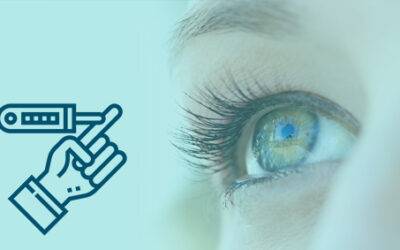Enhancing Performance – How Laser Eye Surgery Can Boost Sports Activities

Laser eye surgery, such as LASIK or PRK, has emerged as a game-changer for athletes, offering improved visual acuity and reducing dependence on glasses or contact lenses. Many top Indian athletes, who recognized the benefits of vision correction surgery, have opted for Laser eye surgery to improve their vision and elevate their athletic performance. Whether you’re a professional athlete or compete at any level, undergoing vision correction surgery could be the key to unlocking your full potential and achieving top-notch performance.
If you are an athlete who wears contacts or spectacles and are looking to up your game, you have come to the right place. In this blog, we will explore how laser eye surgery can enhance sports activities and give athletes a competitive edge, the types of laser eye surgery, and the recovery time for different types of laser eye surgery.
Laser Eye Surgery Benefits for Athletes
- Sharpened Visual Acuity –Visual acuity is the sharpness of one’s vision. Sports activities often require split-second decision-making and precise hand-eye coordination. Improved visual acuity can be a huge advantage in sports when it comes to tracking a ball or an opponent on the field or the court. By reshaping the cornea, laser eye surgery can enhance the eye’s focusing power and correct refractive errors such as myopia (near-sightedness), hyperopia (farsightedness), and astigmatism. With clearer and sharper vision, athletes can anticipate movements, track fast-moving objects more accurately and respond swiftly. This improvement in reaction time and coordination can give them a competitive edge in their sport.
- Enhanced Peripheral Vision – Peripheral vision is a person’s ability to see objects that are outside of their direct line of sight. This is important in many sports such as basketball, soccer, and tennis, as it enables athletes to monitor their surroundings and anticipate movements. Wearing glasses or contact lenses can obstruct peripheral vision and limit an athlete’s field of view. Laser eye surgery eliminates the restriction or hindrance of glasses or contact lenses and provides a wider field of vision. Enhanced peripheral vision allows athletes to react faster to opponents’ actions, spot teammates more easily, and anticipate game dynamics with greater accuracy.
- Improved Depth Perception – Depth perception is a person’s ability to distinguish the distance to, or between objects. In other words, it allows you to see an object in three dimensions – width, length and depth – which is achieved by combining the images from both eyes (binocular vision). This is important in sports such as golf and tennis where athletes need to track or interact with a moving ball or opponent in a three-dimensional space. Poor or reduced binocular vision can cause athletes to misjudge the velocity and direction of a ball or collide more with other players, and this can impact the speed and accuracy of their movements or their reaction time. Since laser eye surgery improves the overall visual function of the eyes, athletes with refractive errors such as near-sightedness or farsightedness can see a greater improvement in depth perception post-surgery.
- Enhanced Comfort and Freedom – Participating in sports with glasses or contact lenses can be uncomfortable and restrictive, especially for those who play for long periods of time. Glasses can slip, fog up, or become a distraction during intense physical activities. Contact lenses may cause dryness, irritation, or discomfort. Laser eye surgery can give athletes the freedom to play without glasses or contact lenses and also reduce eye fatigue and eye dryness. This can help athletes stay comfortable and focused during their sporting activities which can be a huge advantage in sports such as basketball, football, and baseball where vision is critical.
- Uninterrupted Eye-Hand Coordination – Sports activities demand excellent eye-hand coordination, whether it’s hitting a cricket ball, shooting a basketball, or catching a football. Laser eye surgery eliminates the potential obstacles posed by glasses or contact lenses. Athletes no longer have to worry about their eyewear slipping, fogging up, or affecting their depth perception. With improved natural vision, eye-hand coordination can be more precise and consistent, contributing to enhanced performance in sports.
- Increased Confidence and Focus – Laser eye surgery can have a positive psychological impact on athletes. By gaining clear, unaided vision, athletes can experience increased confidence in their abilities. The elimination of visual distractions, discomfort, or the fear of losing or damaging eye wear can allow athletes to focus more fully on their sport. This enhanced mental focus and confidence can translate into improved performance on the field.
- Reduced Risk of Eye Injuries – Contact sports pose a risk of eye injuries, especially for athletes wearing glasses or contact lenses. Glasses can break upon impact, causing eye injuries, while contact lenses can be dislodged or trapped under the eyelid. Laser eye surgery removes these risks, as athletes no longer need to wear glasses or contacts during their sports activities. This provides peace of mind and allows athletes to fully focus on their performance without the fear of eye-related accidents.
- Quick Recovery and Minimal Disruption – One of the advantages of laser eye surgery for athletes is the relatively quick recovery time. Depending on the specific procedure, most individuals can return to their sports activities within a few days to a few weeks. This shorter downtime minimizes the disruption to training schedules or competition participation, enabling athletes to resume their athletic pursuits relatively swiftly.
Types Of Laser Eye Surgery
R eshaping the cornea using a laser enables light to focus precisely on the retina, resulting in crisp, clear vision without the need for corrective eye wear. This can give athletes a competitive edge, allowing them to see the details of the game with enhanced precision. If you are an athlete who is looking for a way to improve your vision and boost your performance, here is a brief overview of the 3 different types of laser eye surgery in India:- LASIK – LASIK (laser-assisted in situ keratomileusis) is the most common type of laser eye surgery that involves creating a flap in the cornea (the clear front part of the eye) and then using a laser to reshape the cornea. This can correct vision problems such as near-sightedness, farsightedness, and astigmatism. LASIK has a relatively quick recovery time and is generally well-tolerated.
- LASEK – LASEK is similar to LASIK, but it does not involve creating a flap in the cornea. Instead, the laser is applied directly to the cornea. LASEK has a slightly longer recovery time than LASIK, but it is also less likely to cause eye injury.
- PRK – PRK is the oldest type of laser eye surgery. It involves removing a thin layer of the cornea and then using a laser to reshape the cornea. PRK has a longer recovery time than LASIK or LASEK, but it is also less expensive.
So what type of laser eye surgery should you have to get better at sports?
I f you are an athlete considering laser eye surgery, the type of laser eye surgery you should have will depend on your individual needs and preferences. Here are a few factors that you should consider when making your decision:- Your individual factors – The suitability of laser eye surgery for sports depends on individual factors such as the stability of your prescription, corneal thickness, and overall eye health. A thorough evaluation by an experienced ophthalmologist is necessary to determine if you are a good candidate for the procedure.
- Your visual requirements – The visual demands of different sports vary. Some sports require excellent distance vision, while others may require good peripheral vision or depth perception. Laser eye surgery can improve distance vision and reduce or eliminate the need for glasses or contact lenses in many cases. However, it may not address other visual issues like astigmatism or presbyopia (age-related reading vision problems).
- The type of sport you play – If you play contact sports, you may want to choose a procedure that is less likely to cause eye injury, such as LASEK or PRK. Some sports organizations have restrictions on athletes who have had laser eye surgery. Be sure to check with your sport’s governing body to see if there are any restrictions before you make a decision.
- Your budget – LASIK is generally more expensive than LASEK or PRK.
- Your recovery time – You will need to wait a few weeks after laser eye surgery before you can resume physical activities and return to sports. This is because you may experience some discomfort and blurry vision as your eyes need time to heal. The duration of this recovery period can vary depending on the procedure and individual healing. Engaging in contact sports or activities with a high risk of eye trauma may require a longer downtime. If you are active and outdoorsy, you may want to choose a procedure that has a faster recovery time, such as LASIK.
- The side effects and risks – Though laser eye surgery is a safe procedure, there are some potential risks and complications which your doctor will discuss with you in detail during your consultation. Some people may experience dryness, discomfort, and redness of the eyes after laser eye surgery. Others may experience halos, starbursts, and glare. If your eyes are already dry, you may benefit from pre-treatment before proceeding with surgery. Some people might need touch-up surgery to enhance their vision. Consult with your doctor to determine the likelihood of experiencing these side effects in your situation.
Ultimately, your eye doctor can help you decide which type of laser eye surgery is right for your sports activities after evaluating your specific needs, lifestyle, and goals. Athletes who are not suitable for laser eye surgery can consider alternative options for vision correction such as prescription sports goggles or specialized sports contact lenses that can provide excellent vision without the need for surgery.
How soon can I play sports after getting laser eye surgery?
T he amount of time you need to wait before playing sports after laser eye surgery depends on the type of surgery you had and your individual healing process. However, most doctors recommend that you wait at least two weeks before returning to low-impact sports, and four weeks before returning to high-impact sports.
Here is a general overview of the recovery time for different types of laser eye surgery:
- LASIK – Two weeks for low-impact sports, four weeks for high-impact sports.
- LASEK – Two to three weeks for low-impact sports, four to six weeks for high-impact sports.
- PRK – Three to four weeks for low-impact sports, six to eight weeks for high-impact sports.
It is important to follow your doctor’s instructions carefully after laser eye surgery. This will help to ensure that your eyes heal properly and that you can return to sports safely.
Here are some additional tips for playing sports after laser eye surgery:
- Always wear protective eye wear. This will help to protect your eyes from further injury.
- Avoid rubbing your eyes. This can irritate your eyes and delay healing.
- Use artificial tears to keep your eyes moist. This will help to prevent dryness and irritation.
- Listen to your body. If your eyes are feeling tired or uncomfortable, take a break.
With proper care, you should be able to return to your favourite sports activities soon after laser eye surgery.
Conclusion
W earing glasses or contact lenses during sports activities can be cumbersome and limit peripheral vision. Laser eye surgery has revolutionized vision correction and can provide athletes with an opportunity to reduce or eliminate their dependency on corrective eye wear altogether. By improving visual acuity and depth perception, optimizing peripheral awareness and expanding the visual field, laser eye surgery can significantly impact an athlete’s performance. With clearer vision and increased confidence, athletes can embrace their sports pursuits with a renewed sense of focus and achieve their full athletic potential.
Read More Eye Care Blogs
4 Eye Problems That Can Result from Diabetes
If you are a diabetic, it means that the blood glucose or blood sugar in your body is too high. Most of the food you eat is broken down by your body into glucose - the main source of energy that is used for the various functions of the body. Insulin (a hormone made by...
Eye Safety at Home – Tips to Prevent Eye Injuries
ur homes are meant to be safe havens, but they can also be unexpected sources of danger, especially when it comes to eye injuries. Whether it's a mundane task like cooking, working in the yard or garden, Do-it-yourself projects, or even playtime...
Safeguarding Young Eyes – A Comprehensive Guide to Preventing Eye Injuries in Children
s parents, guardians, and caregivers, safeguarding our children's well-being is always at the forefront of our minds. Yet, amidst all the protective measures we take, we may inadvertently overlook a crucial aspect of their health - their eyes. Eye...




